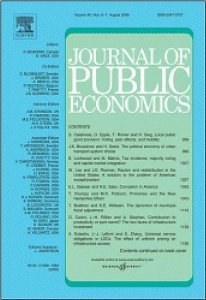
Pradhan, M., \de Ree\, J. and Alessie, R. (2013). The price and utility dependence of equivalence scales: evidence from Indonesia Journal of Public Economics, 97:272--281.
-
Affiliated author
-
Publication year2013
-
JournalJournal of Public Economics
The purpose of this research is to estimate equivalence scales and evaluate their price and utility dependencies. To do this we unify two strands of the empirical literature on this topic, one that relies on demand data and one that relies on subjective evaluations of wellbeing. This way we are able to employ the strengths of both kinds of information. Equivalence scales are not identified from demand data alone. This is because changes in demographics could affect wellbeing directly, i.e., in ways that are not revealed by changes in behavior. The demand-based literature rules out such effects a priori and restricts parameters that measure them. In this paper we do not rely on such restrictions and instead use subjective evaluations of wellbeing as an additional source of information. Because demand data are highly informative about some of the other parameters of the model its use increases efficiency. This becomes critical once we specify complex preference structures that allow for the equivalence scale's dependence on price and utility. Our model nests the typical models used in the subjective and the demand literature and we are able to test down both kinds. We find evidence for direct utility effects. This rejects the validity of some of the restrictions applied by the demand literature within the Indonesian context. We estimate equivalence scales that are of reasonable magnitude and decrease in utility. We also find that the scales increase in the food to nonfood price ratio for poor households, whereas we do not find price dependence for more affluent households. {\textcopyright} 2012 Elsevier B.V.